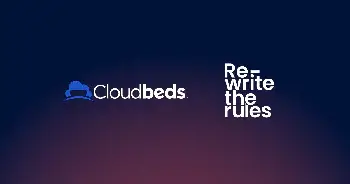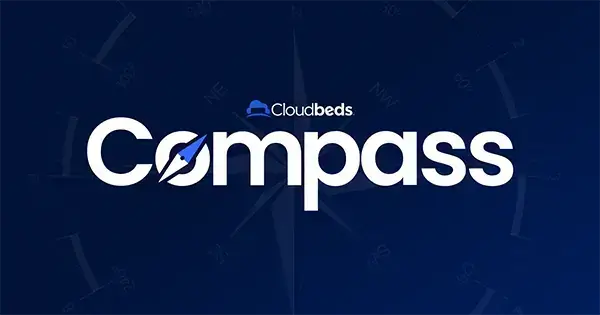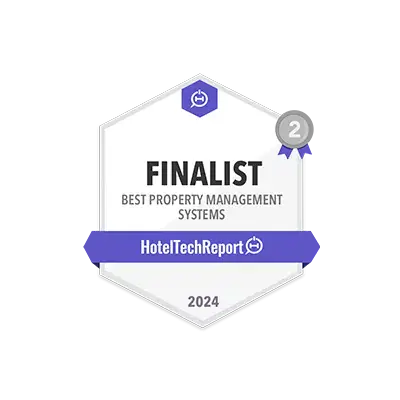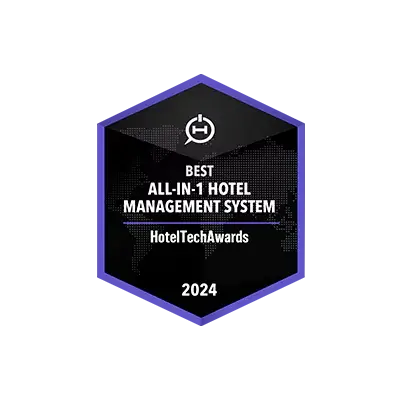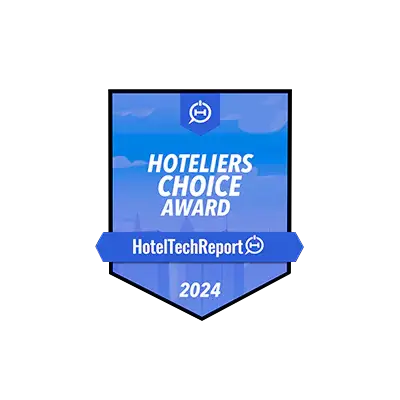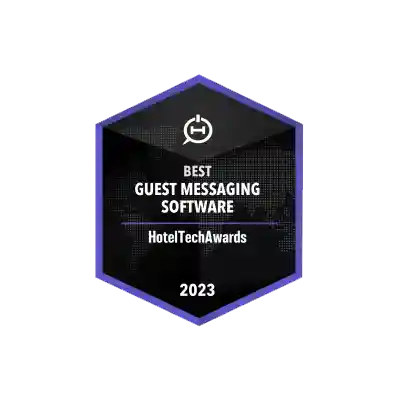
By Cloudbeds
Think back to the last time you made an important business decision for your property.
Were you stuck sifting through data from different systems, trying to piece together relevant insights to help support your decision-making process?
Whether you’re a revenue manager, accountant, front office manager, or hotel owner, you need real-time data and visualizations to understand what’s happening at any given time. That’s where business intelligence comes into play.
Hotel business intelligence takes your existing data and tech stack to the next level. Rather than spending time gathering and organizing data, departments can review and visualize the reports that are most important to them, empowering quick, data-driven decisions.
Here, we explore business intelligence for hotels and how it differs from data analytics. We also take a look at seven of the leading business intelligence solutions on the market, including our own Cloudbeds Insights.
What is hotel business intelligence?
Hotel business intelligence puts the ‘data’ in ‘data-driven. Collecting and analyzing data from various sources, including your property management system (PMS), revenue management system (RMS), payment gateway, and more, empowers teams to make more strategic decisions.
With business intelligence, you have the knowledge to drive hotel operations, increase your revenue, and enhance your guest experience. Applying a more strategic approach towards your data with hotel business intelligence ultimately contributes to the overall success of your business.
Business intelligence vs. data analytics
While business intelligence covers the strategic decision-making side, data analytics works to examine large data sets for patterns to support your decision-making. Data analytics involves what’s called data mining and uses deeper statistical analysis to provide an in-depth understanding of data and future trends.
Data analysis includes various techniques, like predictive analysis, which focuses on the future and utilizes past data to predict future outcomes. When used together, data analytics and business intelligence give hotels an understanding of the past, present, and future to aid in strategic decision-making.
What types of data can I collect for my hotel?
Before we dive into the different types of data you might collect for your hotel operations, we want to preface that your data is not exclusive to first-party data, meaning data you collect about your property through your owned channels.
Your data collection might also include third-party data you’ve gathered from your partner channels. It can be market-specific or collected as part of your marketing campaigns.
Data can be broken down into performance data, market and benchmarking data, and guest data.
Hotel performance data
Performance data includes the key performance indicators (KPIs) hotels track to monitor success. We’ll cover several different types of hotel performance data, including reservation behavior, revenue management, finance and accounting, operational, and marketing data.
Reservation behavior
Reservation behavior data provides a wealth of information on your guests. It’s extractable from sources like your channel manager, booking engine, and property management system (PMS).
Important elements of your reservation behavior help you get a sense of your guests’ preferences, top-performing channels, and patterns to help you target the right guests at the right time.
Common reservation metrics include:
- Length of stay (LOS)
- Booking windows
- Cancellation rate
- No-show rate
- Reservations by rate plan
- Group performance
- Booking source
During Passport 2024, Jackson Chin, Senior Product Manager at Cloudbeds, showcased what business intelligence tools like Cloudbeds Insights can tell hotels about reservation behavior.
Revenue management metrics
Revenue management is the strategic use of performance data, competitor rates, and other applied analytics to predict demand and optimize pricing and distribution to maximize revenue and profit.
Hotels can choose to leverage revenue management systems (RMS) to collect and analyze data or pull relevant information from their PMS, channel manager, and booking engine to glean insights into performance.
Common revenue management metrics include:
- Average daily rate (ADR)
- Revenue per available room (RevPAR)
- Total revenue per available room (TRevPAR)
- Gross operating profit (GOP)
Financial & accounting data
Financial and accounting metrics look at real-time data and provide valuable pricing suggestions that improve the financial health of your hospitality business.
Regardless of the size and complexity of your hotel, financial and accounting data is a crucial component for pinpointing potential cost savings. Financial and accounting data can be pulled from a hotel’s PMS, POS system, payments system, and accounting software.
Common financial and accounting metrics and reports include:
- Folio transactions
- Deposits
- Taxes and fees
- Revenue
- Adjustments
- Voids and refunds
- Billing information
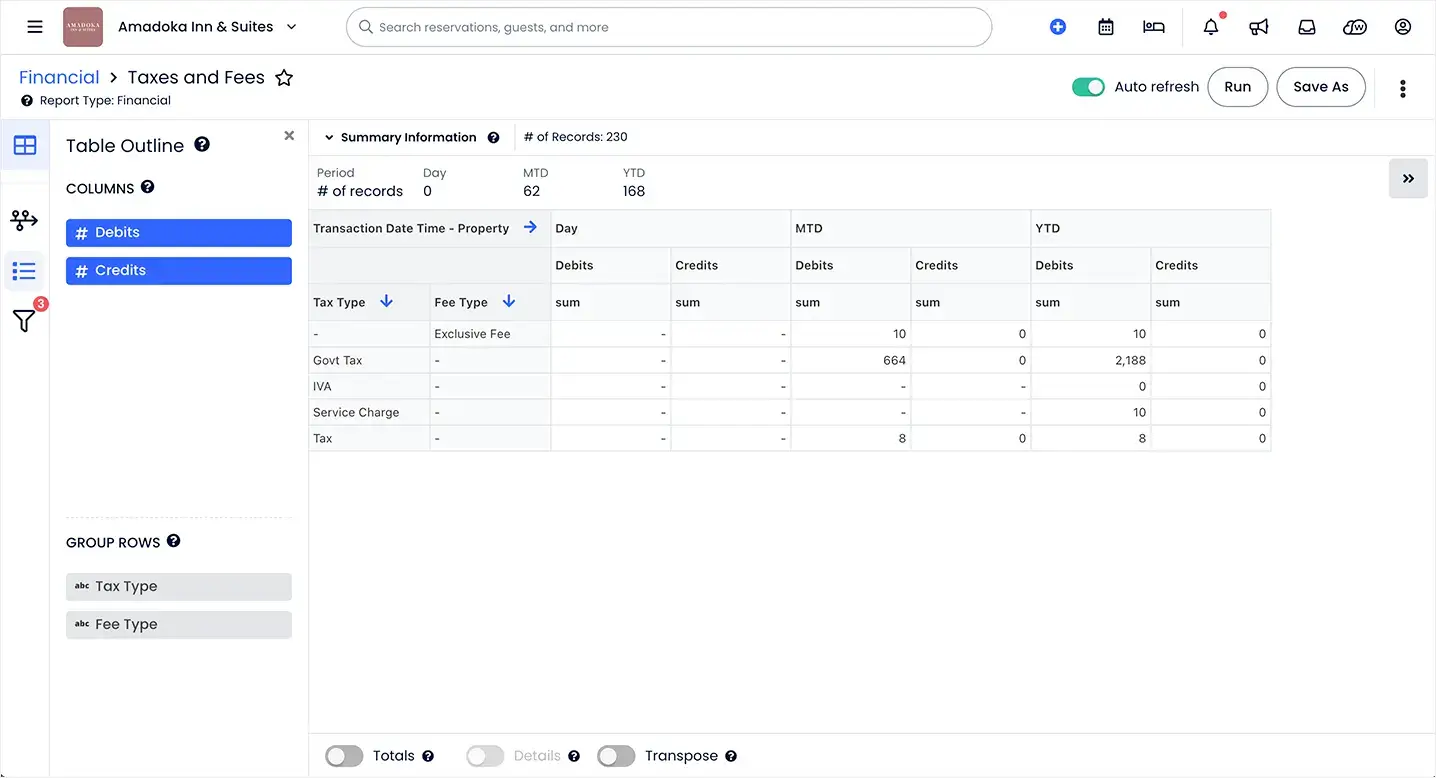
Operational data
Operational metrics, which provide details on costs related to daily operations, labor, and staffing through sources like your PMS and housekeeping software, help you manage resources and proactively plan for the future.
Common operational data metrics include:
- Occupancy history and forecast
- Capacity
- Housekeeping efficiency
- Maintenance response time
- Food and beverage cost percentage
- Out-of-service rooms
Marketing data
Your marketing data captures how well your channels are performing and reports on visitor data to help guide future marketing campaigns.
Marketing data can be pulled from your hotel’s website, social media channels, customer relationship management system (CRM), Google Profile, online travel agencies (OTAs), and metasearch engines.
Common marketing metrics include:
- Website traffic
- Conversion rates
- Cost-per-acquisition
- Cost-per-click
- Cost-per-impression
- Engagement rate
- Click-through rate
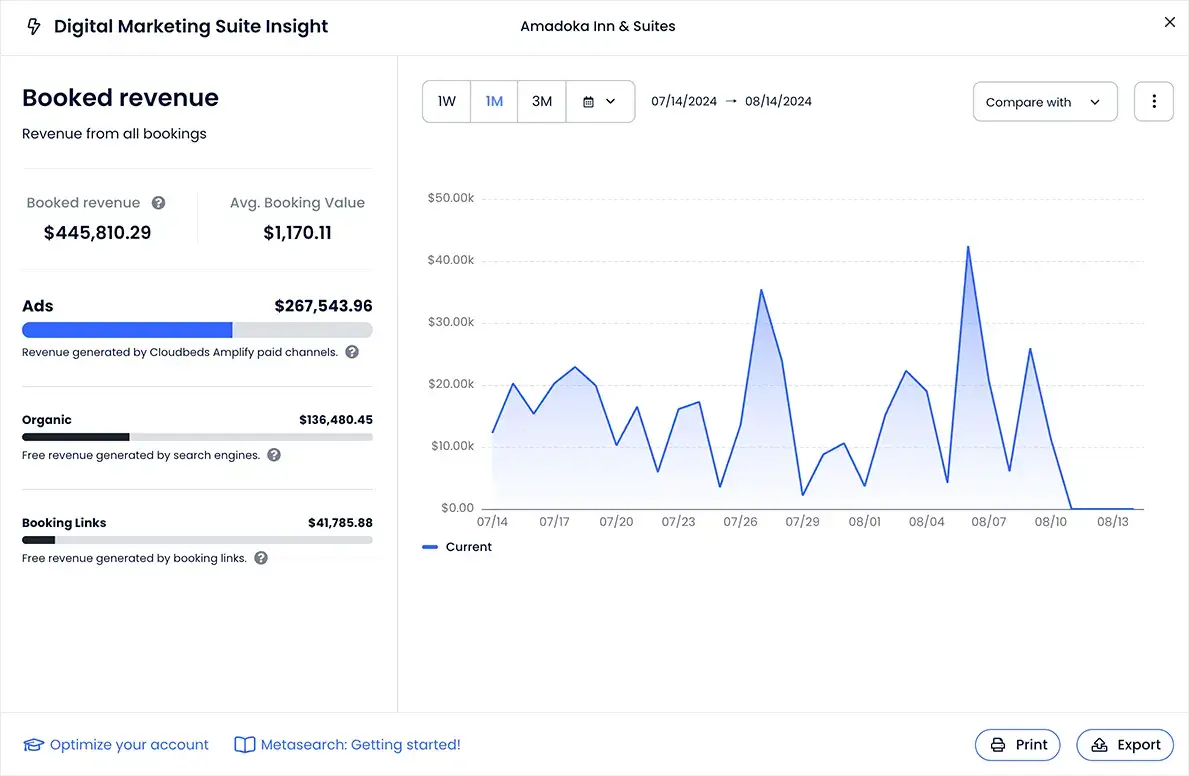
Market & benchmarking data
Market and benchmarking data provide insights into how well a hotel is performing in comparison to its competitors.
Your revenue management system can help you determine your current market position by analyzing your competitor information, as well as your historic, real-time, and forecasted insights. This allows you to adjust your strategies accordingly to stay ahead of the curve.
Hotels can also reference external sources like STR to collect market data for benchmarking and comparison purposes.
Guest data
Guest data offers a wealth of information to boost your hotel performance and improve the guest experience. Information on your guests can be gathered via your PMS, guest engagement system, POS system, CRM system, website, and booking engine.
This data can be used to personalize the entire guest journey, from discovery to post-stay. Through targeted marketing campaigns, personalized communication, and in-person interactions, hotels can boost their bottom line and enhance guest satisfaction.
Important guest data includes:
- Guest contact details
- Demographics (age, gender, location, language)
- Preferences (contact method, room type, dietary restrictions)
- Transaction history (past bookings, spending patterns, payment methods)
- Satisfaction levels
- Loyalty status
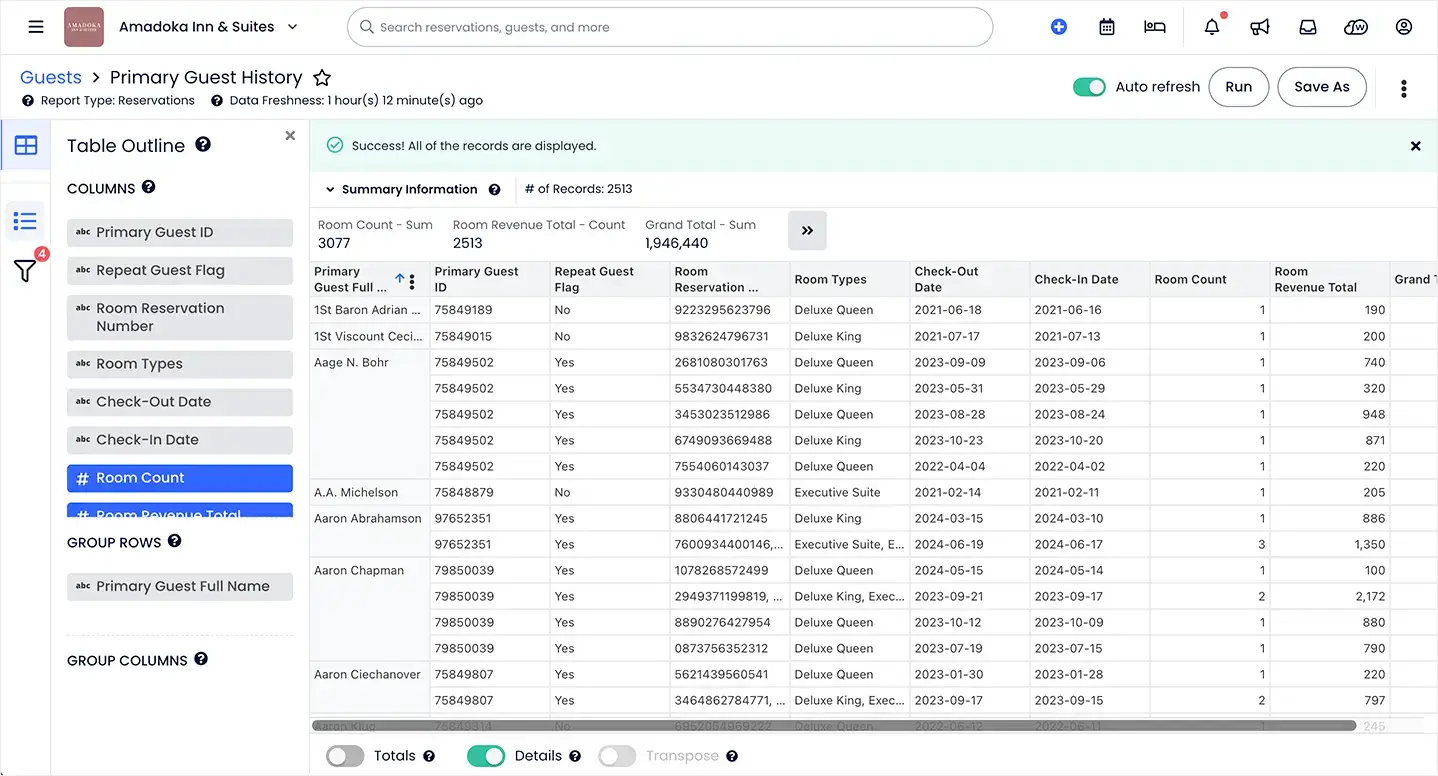
What is business intelligence software?
Business Intelligence (BI) software enables companies to use their data to make better decisions, improve their operational efficiency, and drive revenue growth.
Hotel business intelligence tools gather data across systems and put it together in a way that is easy to understand and implement findings.
Benefits of business intelligence software
Managing data without a business intelligence tool (or the wrong one) can result in considerable inefficiencies for your business. From data silos across departments to hours spent managing Excel spreadsheets, the right tool can transform a hotel.
The right BI tool can help hotels:
- Better visualize data to assess performance fast
- Streamline the data collection process
- Maximize revenue and profitability
- Enhance the guest experience
- Improve collaboration across departments
- Access customizable, real-time data
- Analyze multi-property performance
7 key features of BI software
If you’re considering incorporating a BI tool into your tech stack, take into account these key features. With aspects like advanced reporting and hotel data management as part of your line-up, your hotel business intelligence solutions will enhance guest satisfaction in no time.
1. Advanced reporting
Hotel business intelligence software offering advanced reporting capabilities provides a snapshot of your hotel’s growth and performance. With the option to run custom reports and create personalized dashboards, you can dig into the data that’s most important to your department and overall business goals.
Detailed reports featuring historic and real-time data on occupancy rates and revenue performance, help to progress your current hotel strategies and prepare for the future. Additionally, BI software includes visualization of your KPIs, making it easier to understand and assess your hotel performance.
2. Competitive intelligence
Stay up to date with market trends while monitoring your competitors’ performance with BI software that offers competitive intelligence.
Pulling data from various sources by streamlining data collection, helps you paint a bigger picture of your placement within the market while uncovering emerging trends and growth opportunities for maintaining your competitive edge.
3. Cloud-based
Implementing cloud-based business intelligence software grants you and your hotel’s key decision-makers the flexibility and accessibility to access data and reports anytime, anywhere.
Given the software lives in the cloud, this removes the need for manual spreadsheets and record keeping, reducing costs to your property and increasing scalability, so your software grows as your hotel grows.
4. Forecasting
A BI solution equipped with forecasting capabilities utilizes historical data and present patterns to predict future demand for your business and improve your decision-making.
Taking advantage of accurate forecasting tools allows you to anticipate changes to the hospitality industry, allocate resources, and update your inventory as necessary.
5. Data management
Effective management of hospitality-specific data is a crucial component of a business intelligence system for hotels. Finding a system that can extract, transform, and load (ETL) data in a way that makes sense saves teams a ton of time and energy.
6. Multi-property functionality
If you manage multiple properties, BI software with multi-property functionality features should be on your list.
With multi-prop reporting, users can easily add, remove, group, filter, and analyze information across multiple properties, all from one place. This allows for deeper insights and alignment across the portfolio without the need to export and consolidate spreadsheets.
7. Open API
Look for BI software with an open API, especially if your existing tech stack consists of multiple tools used to operate your hotel.
Seamless connections equals faster processes for ensuring your data and existing tech sync properly with your business intelligence software.
7 leading business intelligence tools
We’ve included seven of the leading business intelligence solutions out there to help you boost operational growth and create an amazing guest experience.
1. Cloudbeds Insights
A hospitality-focused business intelligence solution, Cloudbeds Insights delivers real-time data to all members of your organization, enabling teams to optimize performance across the board – from increasing your total revenue to preparing for the breakfast rush.
With custom reporting, multi-property performance, and compelling visuals and dashboards, teams can aggregate, analyze, and share data across the organization, from front-office managers to data specialists.
2. Amadeus
Amadeus’ business intelligence offering easily integrates with your existing reservation systems and features revenue optimization and guest segmentation analytics.
3. D-Edge
D-Edge integrates with existing customer relationship management (CRM) systems for customized targeting and segmentation of your guests. It also offers comprehensive marketing analytics.
4. Duetto
Business intelligence software Duetto specializes in revenue management, dynamic pricing, and demand forecasting based around data analytics.
5. Lighthouse
Formerly OTA Insights, Lighthouse offers competitive pricing strategies and analysis, as well as forecasting for market demand.
6. M3
M3’s financial management and accounting solutions meet hotel industry standards and are easy-to-integrate with your existing PMS as well as other third party applications.
7. Omniboost
With a primary focus on data integration and analytics, Omniboost gives hoteliers the upper hand in operational efficiency, including inventory management and monitoring performance benchmarks.
A tool for every department
No matter your role, data plays a crucial role in achieving your department’s business goals. Customizable, real-time data empowers teams and gives them the information they need to make smarter decisions. With BI software, you can deliver high-quality data to every department to optimize performance across the board.

